COLUMBIA PATHOLOGY AND CELL BIOLOGY REPORT
A Place Like No Other

Staff Spotlight
New Hire Shout-Outs
New Faculty
Drs. Jadallah and Smithgall
Event Spotlight
Inaugural Charles Marboe Annual Lecture: “Beyond Training”
2023 Summer
Columbia Pathology and Cell Biology Report
Chair
Kevin A. Roth, MD, PhD

Donald W. King, M.D. and Mary Elizabeth King, M.D. Professor of Pathology and Cell Biology
Chair, Department of Pathology and Cell Biology

Pathologist-in-Chief, CUIMC
Department Administrator/CFO
Joann Li, MPA, MPH
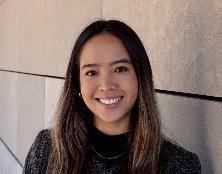
Editor
Layout Designer
Milan Fredricks
Copy Editor and Webmaster
Ping Feng
Content
Gregory Ellner
Taisha Lembert
Chris Santos - SYEP 2023
Photo
Carlos Pagan
Eric Steinhardt
on the cover: Image by Adobe Firefly
7 10 13
and
Reviewers
Contributors
CUIMC ERG
Reports, Editor
Milan Fredricks
University
of Pathology and Cell Biology
W. 168th St., Box 23
York, NY
E-mail
Website:
Spotlight: Dr. Fauci & CNN Visit Pathology 17 Recognition & Appreciation: Lab Week 2023 16 Research: New Publications 9 Staff Spotlight: New Hire Shout Outs! 7 Faculty Promotions & Tenure 5 From the Chair 3 in this issue Education Event: Inaugural Marboe Lecture 13 Staff Spotlight: New Faculty 10 Team Path to a Cure! Velocity @ CUIMC 18
Address correspondence to: PCB
c/o
Columbia
Department
630
New
10032 Email: PathNews@cumc.columbia.edu General
: pathology@columbia.edu
https://pathology.columbia.edu
Dear Department of Pathology and Cell Biology Colleagues and Friends,
It isn’t easy to find the words to succinctly express my gratitude to the amazing people whom I’ve had the pleasure of working with over the past eight years as Chair of this remarkable department. I came to New York City in 2015 with great hope and anticipation, but not knowing what a life-changing experience awaited me at Columbia University. During my tenure in the department, we accomplished many of the goals I outlined in my inaugural message from the Chair, including significant growth in our research portfolio, increased diversity of our faculty, students, and staff; enhanced exper tise and sub-specialization of our clinical programs; and award-winning educational efforts. These milestones would not have been possible without the cooperation and commitment of the dedicated members of the department who every day came together to advance our shared missions. Our successes over the last eight years are too numerous to list here. However, it is impossible for me to write a final departmental farewell without mentioning what we accomplished during the COVID pandemic. Despite personal losses, community tragedy, and a test of our commitment to patient care, research, and education, this department stepped up and stood out. I have never been prouder to be part of a team than I was to be a member of this department when we were needed the most. I will forever be grateful for what you did--what we did--to address a once-ina-lifetime healthcare emergency at the very epicenter of the pandemic. I truly believe we saved lives in NYC and worldwide through our COVID-related clinical and research efforts.
The upcoming years will surely present familiar and novel challenges for the department. Regardless, I have complete confidence that the departmental faculty, students, and staff will work together to achieve great things in the future. You have Columbia “grit,” and it makes you strong! Thank you for making the last eight years of my life such a wonderful experience. I will truly miss being a part of this extraordinary group
Best wishes,
Kevin A. Roth, M.D., Ph.D.
 Outgoing Chair, Pathology and Cell Biology
Outgoing Chair, Pathology and Cell Biology
As I assume the helm as Interim Chair of Pathology and Cell Biology at CUIMC, I would like to first thank Dr. Roth for his exemplary leadership and wise guidance over the past 8 years. Also, I want to express my gratitude for his confidence in me and the insightful instruction he has provided throughout the leadership transition. I would also like to thank all those who sent their best wishes, letters of encouragement, and offers to assist as we enter the new academic year together. I am honored to have the opportunity to lead such an energetic and diverse family of clinicians, scientists, teachers, administrative staff, technical support staff, scholars, and trainees. Together we have established and maintained a tradition of excellence as one of the premier academic pathology departments in the country. We have earned this stature through the hard work, unflagging commitment, and determination of our staff which has allowed us to remain ranked in the top five pathology departments in the country, even though we rank only 25th in size for residency programs. A large share of this success is due to the perspective and leadership provided by our basic science faculty, the academic engine that drives innovation and discovery in our department. Thus, we owe our ability to “punch above our weight class” to the focus, determination, incredible professionalism, and dedication of our faculty and staff.
During my time here, I have become truly impressed and inspired by the commitment of faculty and staff to what we do. Your dedication to the discipline and practice of pathology and your resilience in the face of current and future challenges is truly remarkable and unparalleled. Over my nearly six years here, it has become clear that we are not drawn to Columbia for the payer mix, nor for the reimbursement rate, we come to Columbia because we’re the place where “the best go to become better”.
We will continue to update you as the search for the new chair continues. In the meantime, my goal will be to keep the “trains running on time”. In addition. I will meet with all staff, faculty and trainees, individually or in groups, to hear your ideas on how we can improve on our past and current successes and discuss your thinking on areas in which we need improvement. I look forward to future discussions.
Best wishes,
Kevin Gardner, MD, Ph.D.
 Interim Chair, Pathology and Cell Biology
Interim Chair, Pathology and Cell Biology
3 SUMMER 2023
A
Like No Other FROM THE CHAIR
Place
Honors and Awards
Detton Wins 2023 Charles W. Bohmfalk Award
On May 17, 2023, at the Vagelos College of Physicians & Surgeons graduation ceremony, Alan Detton, Ph.D., associate professor of pathology and cell biology, received the Charles W. Bohmfalk Award for distinguished contributions to teaching in the pre-clinical years.
“The countless hours you give to teaching”, says Katrina Armstrong, Dean of the Faculties of Health Sciences and the Vagelos College of Physicians and Surgeons, “serve both as a model and a legacy, and it is only fitting that you are appropriately recognized.”
Dr. Detton joined the department in 2018. He teaches Gross Anatomy at the VP&S medical school. He is the author of the highly regarded Grant’s Dissector, Sixteenth Edition, the go-to guide for dissection in the anatomy lab. His research interests are the development of dissection-based video content as well as novel 3D interactive anatomy education resources, 3D printing, Augmented (AR), Virtual Reality (VR), and surgical simulation and their evaluation through video analytic usability principles of human-computer interaction.

The Charles W. Bohmfalk Awards, made possible by the generosity of John Frederick and Alice Bohmfalk, was established in memory of Dr. Charles W. Bohmfalk, P&S Class of 1884, to recognize distinguished contributions to teaching. There are two awards, one for teaching excellence during the pre-clinical years and the second for teaching excellence during the clinical years. Each award carries with it a $5,000 honorarium.
Faculty in Spotlight
Yvette C. Tanhehco on the Advancement of Novel Therapies
Yvette Tanhehco, MD, Ph.D., MS , an associate professor of pathology and cell biology at Columbia University Irving Medical Center, was recently interviewed by AABB News about her work in the field of transfusion medicine and biotherapies, particularly focusing on cellular and gene therapies for sickle cell disease.

Dr. Tanhehco discussed her interest in blood banking/transfusion medicine, her research on stem cell collection efficiency, and the development of gene therapies for sickle cell disease. She also highlighted the advancements in novel biotherapies, such as gene therapies, that have improved patient survival and quality of life. Tanhehco mentioned the potential of offthe-shelf induced pluripotent stem cell-derived therapies as the next big development in biotherapies. She emphasized the rewarding aspect of her career in improving patient lives but also acknowledged the challenges of limited resources and staff turnover.
Dr. Tanhehco expressed her wish for more people to be aware of the exciting research being conducted in transfusion medicine and biotherapies. She also mentioned her involvement in the AABB Annual Meeting Education Committee and encouraged members to attend the annual meeting in Nashville. Finally, Tanhehco shared her personal excitement about taking her son to London and Paris during the summer.
To read the full text of this interview, click the link here
4 PCB REPORTS
Alan
faculty
Promotions and Tenure
Swarnali Acharyya, Ph.D. was promotied to Associate Professor of Pathology and Cell Biology (in the Institute for Cancer Genetics)

Claudia Doege, Ph.D. was promoted to Associate Professor of Pathology and Cell Biology at CUMC
Ladan Fazlollahi, MD was promoted to Associate Professor of Pathology and Cell Biology at CUMC
Xiaolin Liu-Jarin, MD, Ph.D. was promoted to Associate Professor of Pathology and Cell Biology at CUMC

Alex Rai, Ph.D. was promoted to Professor of Pathology and Cell Biology at CUMC
Eldad Hod, MD was promoted to Professor of Pathology and Cell Biology (with tenure)



Natura Myeku, Ph.D. was promoted to Associate Professor of Pathology and Cell Biology (in the Taub Institute) at CUMC

Markus Siegelin, Ph.D. was promoted to Associate Professor of Pathology and Cell Biology (with tenure)
Andrew Teich, MD, Ph.D. was promoted to Associate Professor of Pathology and Cell Biology (in Neurology).

Lori Zeltser, Ph.D. was promoted to Professor of Pathology and Cell Biology (with tenure)

On May 24, 2023, Dr. Adela Cimic, MD, assistant professor of pathology and cell biology at CUMC, presented at PI (Pathology Informatics) Summit 2023, Pittsburgh, PA. The title of her presentation was “Remote Frozen Section: Mission Possible for Every Pathology Laboratory.”



5 SUMMER 2023
faculty
Dr. Adela Cimic Presents at the 2023 Pathology Informatics Summit
honors and awards
Peter Canoll and Swarnali Acharyya Win Irving Cancer Drug Discovery Program (ICDDP) Award
Four Columbia University faculty members were selected as winners of the inaugural 2023 Irving Cancer Drug Discovery Program (ICDDP) Award. Among them were Peter Canoll, MD, Ph.D., professor of pathology and cell biology at CUMC, and Swarnali Acharyya, Ph.D., Associate Professor of Pathology and Cell Biology (in the Institute for Cancer Genetics). The ICDDP, which debuted in February as part of the Herbert Irving Comprehensive Cancer Center (HICCC), was established to help faculty accelerate cancer research discoveries and advancements made in their labs to the clinic. Beginning in July 2023, each awardee will receive a $100,000 to $200,000 grant annually for 1 to 2 years to fund research personnel and supplies.
The details of their winning projects are as follows:
“Advancing a new ferroptosis inducing drug (VP224) to clinical trial for GBM”
Lead Investigator: Peter D. Canoll, MD, Ph.D.
Co-Investigators: Jeffrey N. Bruce, MD, professor of neurological surgery; Brent Stockwell, Ph.D., professor of biological sciences; Peter A. Sims, Ph.D., associate professor of systems biology; Osama Al Dalahmah, MD, Ph.D., assistant professor of pathology and cell biology.
Currently, available treatments for glioblastoma (GBM) have very limited efficacy, partly due to quiescent glioma cells resistant to standard chemotherapy forms. Prior studies have shown that an inhibitor enzyme of glutathione peroxidase 4 (GPX4) called RSL3 can induce ferroptotic cell death of quiescent or dormant GBM cells in slices of GBM generated from patient surgical samples and that combining RSL3 with the topoisomerase inhibitor Topotecan, a chemotherapeutic drug that effectively kills proliferating glioma cells, can significantly prolong survival in a mouse model of GBM. The Stockwell lab has recently developed a newer GPX4 inhibitor, VP224, with superior pharmacokinetic properties. After verifying the efficacy of VP224 in a mouse model of GBM, Canoll and his colleagues plan to perform safety studies in preparation for a future clinical trial.
“Developing the first targeted therapy against cancer cachexia”
Lead Investigator: Swarnali Acharyya, Ph.D.
Co-Investigator: Henry M. Colecraft, Ph.D., professor of physiology and cellular biophysics, and pharmacology
Nearly 80% of patients with advanced cancer experience a debilitating, irreversible muscle-wasting syndrome known as cachexia. Cancer patients with cachexia become too weak to tolerate the required dose of anti-cancer therapies and die prematurely from cardiac and respiratory failure due to weak cardiac and diaphragm muscles. Currently, there are no FDA-approved therapies to reduce or prevent cachexia. Recent studies from Acharyya’s laboratory identify a protein called Zip14 as a novel mediator of cachexia in metastatic cancer. Based on these findings, Acharyya and her colleagues propose using anti-Zip14 monoclonal antibodies to inhibit Zip14 function as a therapeutic strategy to prevent cachexia.
Useful Information
Updating online faculty profiles – Faculty members can update their online profiles at http://columbiaprofiles.org/ Regularly updating your profile is strongly encouraged. If you have any questions, please contact pathwebmaster@lists.cumc.columbia.edu
How to update website content – If you find any outdated, incorrect, or missing content on our depar tment website (www.pathology.columbia.edu), and would like to have it updated, please contact pathwebmaster@lists.cumc.columbia.edu.
How to post images on digital monitors – Have interesting images (research, events, people, celebrations, etc.) that you wish to post on our four digital monitors located near the main elevators of the P&S and PH buildings, and King Library, please contact PathNews@cumc.columbia.edu
6 PCB REPORTS
New Hire Shout-Outs
Enlin Carrow, Administrative Fellow



Enlin Carow is the new Administrative Fellow for the Department of Pathology and Cell Biology. Before starting this position, she attended George Washington University for her Master of Health Administration and the University of Pittsburgh for her bachelor’s degree. Enlin is from New Jersey and enjoys exercising, traveling, and attending concerts! She is incredibly excited to begin her journey at the Department of Pathology and Cell Biology.
Alfredo Batenga joined the Department as the new Institutional Billing coordinator in April 2023. Alfredo works with the client billing for the Renal and Neurology Departments. He joins us from his prior role of Accessioning for the Department of Pathology and Cell Biology. Before this, he worked as an Accounts Receivable Specialist for the Clinical Revenue Office, Columbia Doctors. Alfredo earned his bachelor’s degree in nursing in the Philippines in 2009. Alfredo has more than 12 years of experience in medical billing. Outside work, Alfredo is also a Volunteer Firefighter in Paramus, New Jersey.
Tarona Sanders joined the department as Billing Coordinator in April of 2023. She comes from New York Presbyterian Hospital with a background in office management, billing, and other coordinator roles. Tarona has a degree in Health Information Technology and Medical Billing. She is currently completing her qualifications to receive her RHIA credentials. Tarona is excited to join the Columbia family and looks forward to a promising future here.
Martir Ventura joined the Department as Financial Counselor/AR Representative in November 2022. This new role was created to allow our office to take on financial counseling for patients, starting with those receiving genetic testing. With more than 25 years of experience in the medical field, Martir has a proven track record of executivelevel support and management. She has a strong ability to streamline processes, maximize efficiency, and foster professional relationships within organizations. Martir finds enjoyment in helping people and organizations become more successful. Martir is eager and excited to expand her knowledge and gain new experiences in her healthcare career.
Academy of Clinical Excellence
When the Academy of Clinical Excellence (ACE) was founded, our goal was not only to acknowledge clinically excellent faculty but to mentor the next generation of exceptional clinicians. Clinical faculty generally get less mentoring than research faculty, residents, fellows, or students. Capable mentors are in short supply, and time is even more scarce. To help your mentoring needs, they started the ACE Career Guidance and Advisory Service.
Most of our members have volunteered to advise on various clinical issues ranging from reputation building to global health. Faculty with a Columbia Medical Center email are welcome to participate.
For more information on the ACE Career Guidance and Advisory Service and how to register as a mentor, visit the ACE webpage

7 SUMMER 2023
Martir Ventura, Financial Counselor/AR Representative
staff spotlight
Alfredo Batenga, Institutional Billing Coordinator
Tarona Sanders, Billing Coordinator
(Center) Carrie Ruzal-Shapiro, MD, Chair, ACE steering committee Professor of Radiology at CUMC
cuimc announcement
New Discovery Could Stop a Rare Cancer in Its Tracks
Source: HICCC Newsroom, May 8, 2023
A multi-institutional team led by scientists at the Herbert Irving Comprehensive Cancer Center has found a promising new strategy for targeting adenoid cystic carcinoma (ACC), a rare but lethal form of cancer that often develops in the salivary glands. Their research reveals that the two sub-types of malignant cells known to co-exist in these tumors are linked by a “motherdaughter” relationship, identifying a new class of drugs that could halt the disease’s progression.
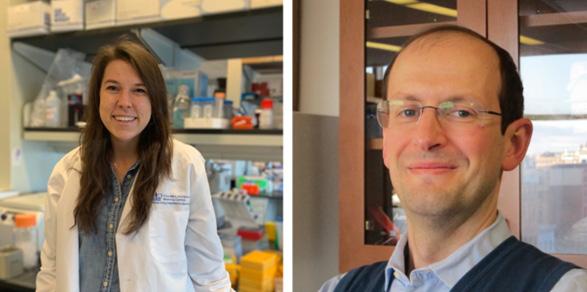
About 1,300 people in the US are diagnosed with ACC each year. “Although rare, it’s really a dangerous disease that is usually diagnosed at a young age, which can have a serious impact on
both the quality of life and life expectancy of patients,” says Piero Dalerba, MD, assistant professor of pathology and cell biology at Columbia University and senior author on the new study, which appears in the current issue of the Journal of the National Cancer Institute. Dalerba adds that, because of its rarity, the condition is an “orphan disease” that has received relatively little research attention. There are no approved medical treatments, and surgery alone often does not achieve a permanent cure.
Understanding malignant cell sub-types for a potential therapeutic target
Pathologists have found that ACCs contain two types of malignant cells, classified based on their appearance: myoepithelial-like and ductal-like. In the new paper, Dalerba’s team, along with collaborators at the University of Virginia School of Medicine and the University of California San Diego, used cutting-edge RNA sequencing techniques and cell sorting to purify the two cell types, study their molecular differences, and clarify their origins.
“We observed that the two cell types do not behave as independent entities but are related to each other so that one acts as the progenitor of the other,” says Dalerba, who is also a member of the Tumor Biology and Microenvironment program at the Herbert Irving Comprehensive Cancer Center. Myoepithelial-like cells give rise to ductal-like “daughter” cells. Using animal models and sophisticated cell culture systems, in which cancer cells are allowed to grow as threedimensional structures called organoids, the researchers also found the cellular signals that drive that transition: retinoids, a group of chemical compounds related to vitamin A.
The team then exploited those findings to attack the tumors. “We can manipulate the cell composition of the tumor pharmacologically so that if we give agonists or activators of retinoid signaling, we can force the myoepithelial-like cells to differentiate into the ductal-like cells. When we poison the same pathway, using suppressors of retinoid signaling, we can actually selectively kill the ductal-like ‘daughter’ cells,” says Sara Viragova, a Ph.D. student in Dr. Dalerba’s laboratory and first-author of the study.
Suppressors of retinoid signaling could extend a disease-free state.
While selectively killing one of the two cell types in a tumor doesn’t eliminate it, in the case of ACC, such an intervention could be life-saving. The early stage of the disease, consisting of mixed populations of myoepithelial-like and ductal-like cells, tends to be slow-growing. That phase can persist for a decade or more until tumors acquire additional genetic mutations that allow ductal-like cells to grow much faster and become dominant.
“It is against these more aggressive forms of the disease that suppressors of retinoid signaling are positioned to be very effective because they are able to selectively kill the ductal-like population,” says Dalerba. Postponing this late, aggressive stage could extend the period during which patients remain disease-free, perhaps even indefinitely.
Dalerba and his colleagues are now characterizing the two cell types in more detail and working to develop and test clinical therapies based on their findings. “So far, we have pre-clinical evidence that the drugs [inverse agonists of retinoid signaling] are active, and our dream is to bring them into clinical trials and test them for anti-tumor activity in patients,” says Dalerba. ◆
8 PCB REPORTS
research
Sara Viragova, Ph.D. (left), and Piero Dalerba, MD (right), led a multi-disciplinary team uncovering a potential new therapeutic target for adenoid cystic carcinoma (ACC).
• Sara Viragova, Luis Aparicio, Pierangela Palmerini, Junfei Zhao, Luis E Valencia Salazar, Alexandra Schurer, Anika Dhuri, Debashis Sahoo, Christopher A Moskaluk, Raul Rabadan, Piero Dalerba Inverse agonists of RAR/RXR signaling as lineage-specific anti-tumor agents against human Adenoid Cystic Carcinoma J Natl Cancer Inst. 2023 Apr 11;djad062. doi: 10.1093/jnci/djad062. Online ahead of print.
• Eric Wu, Alexandro E Trevino, Zhenqin Wu, Kyle Swanson, Honesty J Kim, H Blaize D’Angio, Ryan Preska, Aaron E Chiou, Gregory W Charville, Piero Dalerba, Umamaheswar Duvvuri, Alexander D Colevas, Jelena Levi, Nikita Bedi, Serena Chang, John Sunwoo, Ann Marie Egloff, Ravindra Uppaluri, Aaron T Mayer, James Zou. 7-UP: Generating in silico CODEX from a small set of immunofluorescence markers PNAS Nexus. 2023 May 19;2(6):pgad171. doi: 10.1093/pnasnexus/pgad171. eCollection 2023 Jun.
• Tiffany A. Thomas, Annie Qiu, Christopher Y. Kim, Dominique E. Gordy, Anabel Miller, Maria Tredicine, Monika Dzieciatkowska, Flavia Dei Zotti, Eldad A. Hod, Angelo D’Alessandro, James C. Zimring, Steven L. Spitalnik , Krystalyn E. Hudson Reticulocytes in donor blood units enhance red blood cell alloimmunization Haematologica Early view Apr 20, 2023.
• Osama Al-Dalahmah, Michael G. Argenziano, Adithya Kannan, AayushiMahajan, Julia Furnari, Fahad Paryani, Deborah Boyett, AkshaySave, Nelson Humala, Fatima Khan, Juncheng Li, Hong Lu, Yu Sun, John F. Tuddenham, Alexander R. Goldberg, Athanassios Dova, Matei A. Banu, Tejaswi Sudhakar, Erin Bush, Andrew B. Lassman, Guy M. McKhann, Brian J. A.Gill, Brett Youngerman, Michael B. Sisti, Jeffrey N. Bruce, Peter A. Sims, VilasMenon & Peter Canoll Re-convolving the compositional landscape of primary and recurrent glioblastoma reveals prognostic and targetable tissue states Nature Communications volume 14, Article number: 2586 (2023).
• Liwei Wang#, Catherine Hall#, Jie Li, Eunhee Choi*, Xiao-chen Bai*. Structural basis of the alkaline pH-dependent activation of insulin receptor-related receptor Nature Structural & Molecular Biology 30, 661–669 (2023). (#Co-first, *Co-corresponding author).
• Eunhee Choi* and Xiao-chen Bai*. Activation mechanism of the insulin receptor: a structural perspective The Annual Review of Biochemistry Vol 92 (2023). (*Co-corresponding author).
• Albert Hung and Eunhee Choi How to control Hunger Nature Structural & Molecular Biology 30, 409-411 (2023).
• Ha-Ram Park, Anahita Shiva, Portia Cummings, Seoyeon Kim, Sungsoo Kim, Eunhyeong Lee, Alessandra Leong, Subrata Chowdhury, Carrie Shawber, Richard Carvajal, Gavin Thurston, Joon-Yong An, Amanda W. Lund, Hee Won Yang, Minah Kim Angiopoietin-2–Dependent Spatial Vascular Destabilization Promotes T-cell Exclusion and Limits Immunotherapy in Melanoma Cancer Res (2023) 83 (12): 1968–1983.

• H Yang; Investigating heterogeneous cell-cycle progression using single-cell imaging approaches. Methods Mol Biol, In Press, 2023.
• S Kim, R Carvajal, M Kim, and H Yang; Kinetics of RTK activation determine ERK reactivation and resistance to dual BRAF/MEK inhibition in melanoma. Cell Rep, 2023; 42(6):112570. PMID: 37252843.
9 SUMMER 2023
research
New Publications
New Faculty
Marie C. Smithgall, MD Assistant Professor of Pathology and Cell Biology at CUMC

Dr. Marie Smithgall is an anatomical and molecular pathologist. She earned her M.D. from Columbia University College of Physicians and Surgeons and then completed her residency in anatomic and clinical pathology at Columbia University Irving Medical Center. During this time, she served as a Chief Resident and was actively involved in various research projects as well as medical student teaching. She completed a fellowship in Gynecologic and Perinatal Pathology at Weill Cornell Medicine before returning to Columbia for a fellowship in Molecular Genetic Pathology.
Dr. Smithgall is a member of several professional societies including the International Society of Gynecological Pathologists and the Association for Molecular Pathology where she currently serves on the Publications Committee. Her research interests include molecular mechanisms of gynecologic cancers, and she is passionate about medical student and resident pathology education.
Sana Jadallah, MD Assistant Professor of Pathology and Cell Biology at CUMC

San Jadallah M.D is a board-certified pathologist in anatomic and clinical pathology with expertise in the surgical pathology of tumors of the genitourinary system. She earned her Doctor of Medicine degree from the University of Damascus, Faculty of Medicine, Damascus, Syria. Following that, she pursued her postgraduate medical education, completing a KidneyUrologic Pathology Research Fellowship at Johns Hopkins Medical Institutions, as well as an Anatomical and Clinical Pathology Residency at the University of Medicine and Dentistry of New Jersey (UMDNJ)/Rutgers University. Additionally, she completed specialized fellowships in Urologic Oncologic Pathology and Oncologic Surgical Pathology at Memorial Sloan-Kettering Cancer Center (MSKCC).
Previously, Dr. Jadallah served as an Assistant Professor of Anatomical Pathology at Weill Cornell Medical College, New York-Presbyterian/Queens, within the New York-Presbyterian system. With a keen focus on neoplastic urologic pathology, a passion for teaching and mentoring, and over 10 years of expertise, Dr. Jadallah is poised to make valuable contributions to our medical team. Enthusiastic about joining this exceptional organization, Dr. Jadallah eagerly anticipates utilizing her skills and knowledge to positively impact patient care and medical research.
graduate program
Recent Theses Defended
Qi Jin, Howard Worman Lab, July 10, 2023
10 PCB REPORTS
staff spotlight
“Uncovering the functional roles of nuclear lamina proteins associated with Emery-Dreifuss Muscular Dystrophy”
“An image-based, multidimensional analysis of cortical interneuron synapses reveals novel bouton subclasses”
Patrick Dummer, Edmund Au Lab, July 26, 2023
In The News - Gross Anatomy at Columbia
The Columbia University Vagelos College of Physicians and Surgeons began hosting a donor gratitude ceremony in the late 1970s as a way of marking an experience that “is very difficult for some students and really transformative,” said Paulette Bernd, who runs the school’s clinical gross anatomy course. Below is the full text of the article published in the New York Times on May 31, 2023.
Gratitude ceremonies give students and faculty members a chance to recognize the sacrifice of those who gave their bodies for medical research and education and the loved ones they left behind.
It is not clear how many people in the United States donate their bodies for medical research and education, though estimates suggest that about 20,000 people or their families do so each year. Criteria vary by program and by state; generally, anyone over 18 can become a donor, though people with certain transmissible diseases, such as hepatitis B or C, tuberculosis, H.I.V., or AIDS, are typically excluded. Many programs also exclude bodies that have been autopsied or have had organs removed for donation.
A solemn gathering at Columbia University last month had the trappings of a traditional memorial service. Students and faculty members performed music and gave speeches. The university’s chaplain closed the ceremony with a reflection.
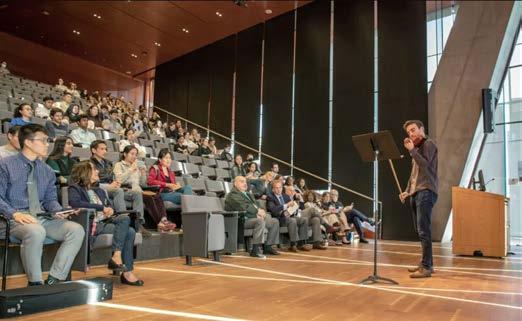
But there was one key difference: No one in the room had ever met the people whose lives were being honored. The attendees were all students and faculty members at Columbia’s medical school, and they were gathered to show gratitude for the people who had donated their bodies for the students to study in the anatomy lab.
“Who were they before?” said Bree Zhang, a first-year dental student. “A parent, a child, a co-worker, a friend? What books did they read? How is their family doing now, and do they know how much their loved one has given me and the rest of us?”
Similar scenes played out across the country this spring as medical, dental and physical therapy students assembled to offer tributes to whole-body donors and their families. At the ceremonies, students perform music, light candles, read letters and share art. (A heart diagram from Ms. Zhang’s anatomy studies, overlaid with her whimsical drawings of books, tree roots and human figures, was projected behind her as she spoke at Columbia.) A nondenominational spiritual leader often plays a role. Sometimes a tree designation or an offering of flowers to a donor’s family is included.
Even with the introduction of elaborate 3-D visualization software, dissection remains a cornerstone of a medical education for most first-year students, as it has for centuries. Students spend months methodically studying the structures of the body, including organs, tendons, veins and tissue. The experience teaches more than the foundations of medicine. Treating the donor, who is viewed as a doctor’s first patient, with respect and care gives students a grounding in ethics and professionalism, said Joy Balta, the chair of the American Association for Anatomy’s human body donation committee.
Recognizing a sacrifice
Body donation is a selfless act by the donors, as well as by their families, who can wait as long as a couple of years to receive the ashes. The memorials, often called ceremonies of appreciation or gratitude, recognize the sacrifice.
“You‘re able to think about the donor that you‘ve been working with,“ said Dr. Balta, who is also the director of the Anatomy Learning Institute at Point Loma Nazarene University in San Diego. “These are people,“ he added, “that donated their bodies, that wanted you to work with them to improve science and health care.“
The Vagelos College of Physicians and Surgeons at Columbia began hosting a donor gratitude ceremony in the late 1970s as a way of marking an experience that „is very difficult for some students and really transformative,“ said Paulette Bernd , who runs the school‘s clinical gross anatomy course.
(continued on page 12)
11 SUMMER 2023 education
The Vagelos College of Physicians and Surgeons at Columbia has hosted donor gratitude ceremonies since the 1970s, said Paulette Bernd, who runs the school’s clinical gross anatomy course. Credit: Diana Cervantes for The New York Times.
Campus News
In The News - Gross Anatomy at Columbia
(continued from page 11)
Relatives of the donors are invited to the events at some schools. At others, the ceremonies are only for students and faculty members, an extension of the anonymity that is provided to the donors in the lab. At Brown University, for instance, only a donor’s age, cause of death, marital status and occupation are shared with students, and the donor’s hands and faces are covered for much of the process.
“The bodies go through this whole process of being de-identified,” said Nidhi Bhaskar, a first-year medical student who helped coordinate a gratitude ceremony at Brown this month. “And this is a really great way to re-humanize them. We take into account the very real gift they left, and the family members who are still processing their loss.”
The anatomy lab can be a fraught experience for medical students, for whom “it may be their first experience where they’re dealing with death and dying,” said Dr. Daniel Topping, a clinical associate professor in the department of anatomy and cell biology at the University of Florida College of Medicine.
Abby Carey-Ewend, a second-year student at the Washington University School of Medicine in St. Louis, remembers being incredibly nervous about it.
“But when I started it,” she said, “I realized that it was really a phenomenal opportunity to be able to work with three other students and one donor, and to really learn the intricacies of the human body from something beyond a textbook or videos.”
Ms. Carey-Ewend helped plan the appreciation ceremony for her medical program, which was held in April. A priority, she said, was acquainting family members of the donors with the campus community and the students their loved ones had helped educate.
‘I knew she was helping somebody.’
Among the guests at the ceremony at Washington University was Regina Dunn. When her mother, Louise Dunn, died in July at 90, she was too distraught to plan a funeral. The donor remembrance was Louise Dunn’s first memorial service, she said.
“They just made you feel so comfortable,” Regina Dunn said of the students. “And a lot of people wanted that closure.”
Louise Dunn, who opened a modeling school for women of color in St. Louis in 1960, was driven throughout her life by a desire to help people, her daughter said. So it was not surprising that she wanted to continue to help others after her death, Ms. Dunn said, even if some of her survivors had to overcome a degree of apprehension over her decision to donate her body to science.
Regina Dunn said that a Black student told a friend who accompanied her to the ceremony that having a Black donor in the lab, when most donors are white, had a profound impact.
“I felt honored, I really did,” Ms. Dunn said, “because I knew she was helping somebody.”
For the family of Michael Haas, who donated his body to the Indiana University School of Medicine, a gratitude ceremony last month was a full-circle moment in several ways.
It was held on April 16, four days before the anniversary of Mr. Haas’s death, his wife, Molly Haas, said. The ceremony was held on the university’s campus in Bloomington, Ind., where the couple were engaged in 1970. The families received white and red carnations; Ms. Haas recalled that her husband always bought her red carnations.
Both decided to donate their bodies in 2012, around the time that the symptoms of Mr. Haas’s Alzheimer’s disease began to show. For Mr. Haas, a former social worker and Episcopal priest, becoming a whole-body donor was a way of extending a lifelong mission of service, his wife said.
“His values, his ethics were always very generous,” Ms. Haas said.
‘A great sense of gratitude’
The appreciation ceremonies are typically planned by students, but they also give the faculty members who run the anatomy labs a way of processing their relationships with the people who donate their bodies for medical education.
“I feel a great sense of gratitude and responsibility and honor every time I’m around a donor,” said Dr. Topping, of the University of Florida. “It’s a very sacred thing for me.”
(continued on page 11)
12 PCB REPORTS
(continued from page 12)
When the Zucker School of Medicine at Hofstra University, on Long Island, made its gratitude ceremony a virtual event during the coronavirus pandemic, it allowed donor relatives from across the country and around the world to participate, said Robert Hill, an associate professor. In 2020, relatives of one donor logged on from India, he said.
“It’s a way of bringing closure to their shared journey,” he said. “Our students are on an educational journey, and our donor families are navigating the world without their loved one.”
Nirusha Lachman, the chair of the department of clinical anatomy at the Mayo Clinic College of Medicine and Science, attended her first gratitude ceremony about 40 years ago when she was a student in South Africa, and she has since spoken at several.

The gatherings, she said, serve to drive home the point that donors live on through the education that their bodies have provided.
“You want this to resonate, even with the families,” Dr. Lachman said, “that death was not the end for their loved ones.”
education
Event Spotlight
BY MILAN FREDRICKS
On May 30, 2023, the Department of Pathology and Cell Biology held the Lattes Symposium and Inaugural Marboe Lecture. Dr. Charles Marboe, emeritus professor of Pathology and Cell Biology, gave the inaugural lecture “Beyond Training.” Dr. Marboe has had a remarkable 45+ year career in the Columbia University Department of Pathology and Cell Biology, which includes his tenure as director of the department’s residency training program and vice chair for education. Dr. Marboe has been a generous and caring mentor to more than two decades of trainees, and his commitment to graduate education is wellknown and well-regarded.
In his talk, Dr. Marboe explored the importance of continuous learning and adaptability in the field of pathology and cell biology, emphasizing that training is only the beginning of a lifelong journey of knowledge. With his extensive experience and invaluable insights, the nature of Dr. Marboe’s talk led to a dynamic exchange of ideas, with impactful conversations and shared stories, anecdotes, and history during the Q&A session that followed.
“Dr. Marboe’s lecture gave us his insight into the history and institutional wisdom of our department. He had residents, fellows, and faculty spilling out of the room and many tuning in over zoom. As always Chuck brought a lot of heart, in more than one way. There were smiles, laughter, and a palpable warmth among all in attendance. Truly an unforgettable lecture,” said Carlos Pagan, MD, assistant professor and director of the residency program.
Dr. Marboe’s lecture is the first of annual talks intended to inspire and foster growth in students, trainees, and faculty at CUIMC. The Marboe lecture series will ensure quality education within the department, supporting the accomplished educators and faculty members who help shape future pathology leaders by bringing together distinguished speakers and stimulating thought-provoking discussions on pertinent topics in the field. The department is grateful to Dr. Marboe for his inspiring lecture and looks forward to the next installment of this lecture series. Stay tuned for updates about the next Lattes Symposium and Marboe Lecture. For more information about this and other educational initiatives in the department, please visit our website. If you missed the lecture or wish to revisit it, you can view the full recording of the Charles Marboe Inaugural Lecture, “Beyond Training,” here. Enjoy!
MORE INFO: The annual Dr. Charles Marboe Lecture was created in honor and recognition of Dr. Marboe’s distinguished career at Columbia University and within the Department of Pathology and Cell Biology. The lectureship will continue Dr. Marboe’s history of sharing his cardiovascular pathology, cardiology, and heart transplantation expertise and ensure quality education within the department by supporting Columbia’s most important assets: its accomplished educators and faculty members who shape future leaders. Visit https://bit.ly/3NfMAOf to make a tax-deductible gift to the Dr. Charles Marboe Lecture fund.
13 SUMMER 2023
“Beyond Training,” The Dr. Charles Marboe Inaugural Lecture at the Lattes Symposium
Photo credit: Carlos Pagan, residency program director
◆
CUIMC & Pride 2023
Department hosted Drag Story Hour with Harmonica Sunbeam
BY MILAN FREDRICKS
For Pride Month 2023, the CUIMC LGBTQ+ ERG hosted “Drag Story Hour with Harmonica Sunbeam” in our King Library on June 22nd. Miss Sunbeam read from LGBTQ+ friendly books to an enraptured audience of CUIMC employees, in person and virtual.
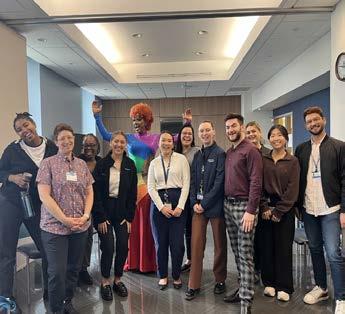
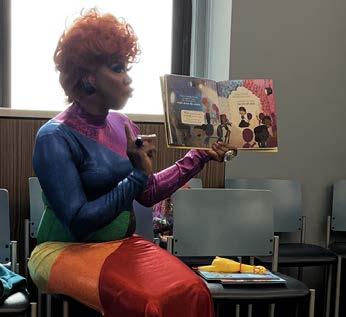

This joyful event was a delightful fusion of education, entertainment, and community celebration. Dressed in a vivid costume with flamboyant colors and sparkling sequins, Miss Sunbeam brought a dazzling energy to the room, making everyone feel welcome and included.
The reading list curated by Miss Sunbeam featured three delightful children’s books that explore gender identity, inclusivity, family, and allyship. They were “You Need to Chill” by Juno Dawson, “ABC Pride” by Louie Stowell, and “My Shadow is Purple” by Scott Stuart. Each book brought awareness to the many facets of the LGBTQ+ community, emphasizing the beauty of individuality and the power of being true to oneself.
“an amazing opportunity to celebrate inclusivity in the workplace”
Despite the split between in-person and virtual attendees, the event was characterized by a sense of unity. Attendees were encouraged to ask questions and share their thoughts, fostering a dialogue that was not only informative but also heartwarming and inclusive.
Drag Story Hour with Harmonica Sunbeam was a bright spot in Pride Month 2023, a colorful blend of inclusivity, learning, and celebration serving as a clear testament to CUIMC’s commitment to celebrating diversity and inclusion. The event left a profound impression on the attendees, leading to meaningful conversations about inclusivity and acceptance at CUIMC and beyond.
As said by attendee Courtney Sinn, academic affairs manager of Pathology and Cell Biology, “This was one
of the best ERG events I have attended yet! Harmonica Sunbeam was an amazing host who kept us entertained with great stories that centered messages of acceptance, inclusivity, and individual authenticity. It was great to connect with peers across the university and come together for an event that spotlights and celebrates queer culture in such a thoughtful and engaging way.”
“When asked what the event meant to her as an attendee, Susan Ceballo, HR generalist, said…” the event was an amazing opportunity to celebrate inclusivity in the workplace. It provided a safe and open space to share one’s story and learn from others lived experiences.” The consensus was clear among attendees: it was a remarkable Pride Month celebration that will be remembered fondly.
14 PCB REPORTS
Miss Sunbeam (left) and Ashley Boyce, Manager, DEIB Staff Engagement (right) posing for the camera. Click, click.
Photo credit: CUIMC ERGs
Miss Sunbeam reading to her rapt audience.
Smiling faces and a radiant Miss Sunbeam wrap up the event.
event highlights
A Fond Farewell: Celebrating Our Outgoing Chair, Dr. Kevin Roth
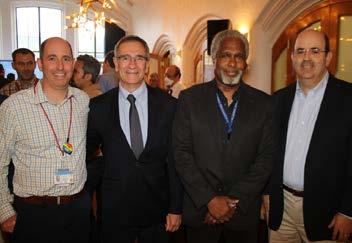

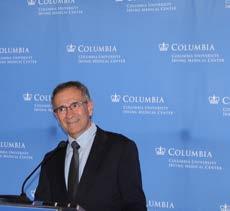 BY MILAN FREDRICKS
BY MILAN FREDRICKS
On July 25th, the department gathered in the VP&S Faculty Club to bid a fond farewell to Dr. Kevin Roth, the outgoing pathology and cell biology chair. For the last eight years, Dr. Roth has shaped and guided the department through a strategic vision of collaboration, diversity and inclusion, and a shared ethos of education.
The evening was not just a farewell but a celebration of Dr. Roth’s contribution to the department. Some faculty colleagues spoke briefly, each taking the opportunity to express their appreciation and to share their personal experiences working alongside Dr. Roth. There were stories of triumphs, shared challenges overcome, and anecdotes of invaluable lessons learned, with laughter all throughout. The common thread among all these narratives was the profound respect and admiration held for Dr. Roth.
A particularly touching and entertaining moment was when Joann Li, department administrator, gave presentation of the department’s rich history of chairs, and formally added Dr. Roth to that honorable group. Here’s to a remarkable leader – your legacy will live on in the department. Thank you for your dedicated service and the profound impact you have made.
2023

15 SUMMER 2023
Representing the Department of Pathology and Cell Biology at the @columbiamed LGBTQ+ Pride event on June 21st from 12:00 to 2:00 PM. In the photo (left to right) are Joann Li, Department Administrator, and Tiffany Thomas, MD, Assistant Professor of Pathology and Cell Biology at CUMC
Photo credit: Eric Steinhardt, IT director
Left to right: Drs. Eldad Hod, Kevin Roth, Kevin Gardner, and Glen Markowitz
Joann Li and Dr. Kevin Roth share a happy moment after the presentation
event highlights
CUIMC & Pride
Lab Week 2023: Celebrating Gratitude and Service at Pathology

The theme of Lab Week 2023 was gratitude, and we showed our gratitude for our department members with the inaugural Gratitude Award and Ten-Year Service Recognition Breakfast.

During Lab Week (April 23-29), we encouraged pathology and cell biology staff to nominate each other based on four criteria: list criteria on nomination form. We received several nominations extolling the virtues of collaboration, leadership, and good stewardship and posted them proudly on our digital monitors for all to see.
On the morning of Friday, April 28, the department organized a repast and recognition event at the Todd Amphitheater to commemorate the ten-year service anniversary of thirty Pathology and Cell Biology members. Knowing that the key to any festivity is refreshments, we had coffee, bagels, and pastries for everyone to enjoy. It was a great way to start the day and an enjoyable end to Lab Week: a delicious breakfast and a celebration of our colleagues, honoring the hard work, dedication, and commitment these individuals contribute to our community.
Ten years is no small thing! Congrats on reaching this milestone! Pictured from left to right. Top row: Abel Gonzalez. Markus Sieglin. Bottom row: Qian Xie, Zheng Xu, Hanbin Dan, Chris Freeman, Eric Steinhardt, and Angelic Pla. Milan Fredricks, also celebrating ten years, was the photographer.

New Intranet Launched!
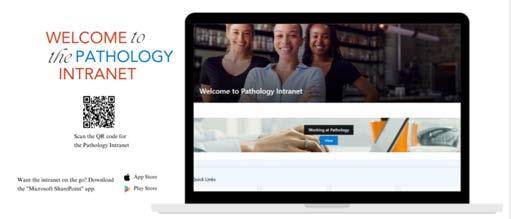
The Pathology department officially launched our new intranet platform in June 2023, marking a significant step toward a more connected and efficient workplace. The intranet, a private network for the department, is designed to enhance communication, collaboration, and resource sharing, acting as a centralized hub for all departmentrelated information and tools.
The new intranet features a department directory, a news section, employee spotlights, events, and access to a library of department-specific manuals, templates, guides, and FAQs. As a tool for and by the department, we want your feedback on how we can improve. The next development phase involves enhancing the intranet with more user-relevant content and resources. Please visit the intranet and complete the feedback form on the homepage to provide your feedback on additional features to better support your daily work.
The launch also kicked off a contest for naming the intranet, with the winner gaining the honorary title of “Naming Champion” and a gift certificate. We polled the department on the names submitted, with the most popular name submitted by Dr. Hee Won Yang. So, introducing our new intranet...PathConnect!
16 PCB REPORTS
recognition & appreciation
Going by their smiles, the vests are a Lab Week hit!
More smiles and good eats at the AP Lab luncheon
Read more about Lab Week 2023 on The (new name of intranet), the new Pathology and Cell Biology intranet!
Pathology Hosted Dr. Anthony Fauci visit for an interview with CNN’s Christine Amanpour Pathology in Spotlight
 BY MILAN FREDRICKS
BY MILAN FREDRICKS
On April 27, 2023, Dr. Anthony Fauci, former chief medical adviser to President Biden and former director of the U.S. National Institute of Allergy and Infectious Diseases, talked to CNN’s Christiane Amanpour about lessons for the next pandemic. The backdrop of this important discussion was the Donald W. King, MD Library at the Department of Pathology and Cell Biology at the Columbia University Irving Medical Center.
As Dr. Fauci sat in front of a glass-enclosed antique microscope, he reflected on the challenges and triumphs of the past pandemic while emphasizing the need for preparedness in the face of future pandemics.
Throughout the interview, Dr. Fauci stressed the importance of robust and proactive public health measures, including early detection and rapid response systems. He highlighted the necessity of strong international collaboration and information sharing among nations, as pathogens recognize no borders. Drawing from his experience in leading the U.S. response to the pandemic, he emphasized the significance of investing in research, healthcare infrastructure, and the development of effective vaccines and therapeutics. “[T]he scientific preparedness and response… was a resounding success”,
said Dr. Fauci. “To have the sustained investment in basic and clinical biomedical research that allowed us to begin the vaccine development program…and at the end of 11 months to have a vaccine that was safe and effective –that is beyond unprecedented.”
Amid the quiet ambiance of the library, Dr. Fauci spoke passionately about the vital role of science and evidencebased decision-making in shaping effective pandemic responses. He emphasized the importance of public trust in scientific institutions and the need to communicate accurate information transparently to combat misinformation and confusion.
Dr. Fauci’s interview within the walls of the Donald W. King, MD Library symbolized the intersection of scientific expertise and public health, providing an inspiring setting for discussing lessons learned and charting a path forward. It also underscored the tireless work and rigorous research conducted by Columbia pathology and cell biology faculty, who provided critical insights into the pathogenesis of Covid-19 and contributed to our understanding of the virus.
Overall, Dr. Fauci expressed his hope that the lessons learned from the recent pandemic would serve as a foundation for a more prepared and resilient global health system and a reminder that evidence-based research is the best path forward.
View the CNN segment here
Useful Information
There are many tax advantages to giving appreciated stock to the Department of Pathology and Cell Biology. In donating appreciated securities, you avoid capital gains tax and qualify for a charitable income tax deduction for the full value of the securities.
17 SUMMER 2023
in the news
Please visit www.giving.cuimc.columbia.edu/ways-give/gifts-securities for more information.
Velocity at CUIMC
Join us on Sunday, October 8th, for Ride Day at The Velocity Day Festival! There will be lots to enjoy, including a beer garden (for those 21 and up), music, food, family activities, and more! The Department of Pathology and Cell Biology will participate in Velocity: Columbia’s Ride to End Cancer on October 8th, and we want you on our team, Path to a Cure!
You can choose to join us in person on one of three cycling routes: 15K (9mi), 50K (31mi), or 100K (62mi). Alternatively, you can join us remotely as a “Your Way Participant” by completing any activity you choose from anywhere and anytime on or before Velocity Day.
How Can You Get Involved?
There are many ways you can get involved. Whether you’re

an experienced cyclist or just learned how to ride a bike, you can be a part of Velocity and join Columbia’s movement to solve cancer!

Velocity Your Way
If you’re not a cyclist or can’t join us on October 8th, don’t worry! You can still participate remotely as a “Your Way Participant.” Simply choose an activity and complete it on or before October 8th. Learn More about being a Your Way Participant
Become a Volunteer
Velocity couldn’t happen without passionate volunteers helping to make Velocity Day a success. There are ample opportunities to help out on Ride Day. If you’re interested in volunteering, you can learn more about it on the Velocity website. Learn More about Being a Velocity Volunteer
Lastly, you can support our team by fundraising or donating directly to our Team page. No matter how you choose to join us, you’ll be helping the Columbia Cancer Center and our mission to find a cure for cancer. Learn more today!
Pathology and Cell Biology is hiring!


Grants Manager -- Pathologists’ Assistant --Technician A -- Technician B-Clinical Laboratory Technologist -- H.R. Generalist -- Cytogenetic/FISH
Technologist
The department of Pathology and Cell Biology is looking for passionate, qualified, high-performing candidates to join us in our mission of providing global leadership in scientific research, patient care, and health and medical education. The Employee Referral Program Pilot is intended to increase recruitment success by widening applicant pools beyond current search measures (Indeed posting, Zip Recruiter, LinkedIn, and University Applicant Tracking System applications), engaging current employees in the recruitment process, and providing a reward structure for employees who refer candidates into the pool who can be converted into successful new hires.
See All Non-Academic Job Opportunities at Pathology
18 PCB REPORTS
SUMMER 2023




 Outgoing Chair, Pathology and Cell Biology
Outgoing Chair, Pathology and Cell Biology
 Interim Chair, Pathology and Cell Biology
Interim Chair, Pathology and Cell Biology





























 BY MILAN FREDRICKS
BY MILAN FREDRICKS





 BY MILAN FREDRICKS
BY MILAN FREDRICKS




